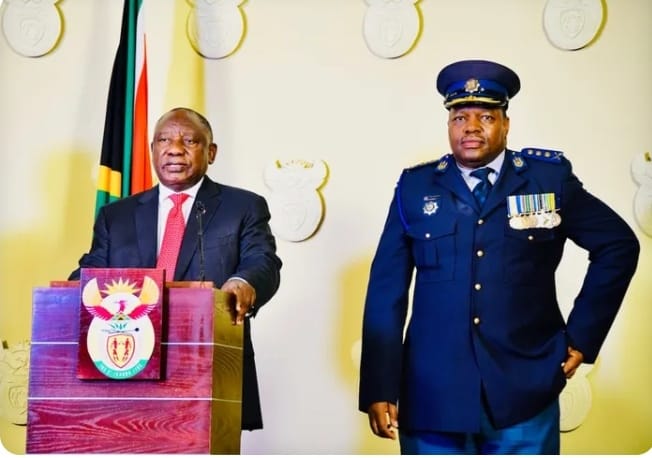
Ramaphosa 121 KZN killing dockets return sparks intense debate over political interference in South Africa’s police investigations. Image credit: Supplied/GCIS
(The Post News) – Ramaphosa 121 KZN killing dockets have become a flashpoint in South Africa’s political landscape. While some groups have praised National Police Commissioner General Fannie Masemola for returning these 121 investigation files to KwaZulu-Natal, President Cyril Ramaphosa is reportedly displeased by the move.
The dockets are key to investigating allegations of political interference made by KwaZulu-Natal Provincial Commissioner Lieutenant General Nhlanhla Mkhwanazi. Initially removed from the province, the Ramaphosa 121 KZN killing dockets were sent back so local authorities could resume their important work.
Ramaphosa 121 KZN killing dockets stir political tension
Several South African political parties and communities have welcomed National Police Commissioner General Fannie Masemola’s decision to restore the 121 investigation dockets to KwaZulu-Natal. However, President Cyril Ramaphosa reportedly expressed anger about this action. The dockets are central to claims of political interference raised by KwaZulu-Natal’s Provincial Commissioner Lieutenant General Nhlanhla Mkhwanazi.
In July, Mkhwanazi accused suspended Police Minister Senzo Mchunu of meddling in police affairs, including the disbandment of the Political Killings Task Team and the removal of the 121 dockets from the province. He further alleged that Mchunu shielded individuals implicated in politically motivated crimes.
According to reports, President Ramaphosa questioned why the dockets were initially taken from the office of suspended deputy police commissioner Shadrack Sibiya. Ramaphosa reportedly contacted acting Police Minister Firoz Cachalia to raise concerns about the timing of Masemola’s actions, especially with a judicial commission of inquiry soon to investigate.
Presidency spokesperson Vincent Magwenya explained that the return of the 121 dockets is far from a routine administrative matter; instead, it is central to the judicial commission’s investigation. Ramaphosa expects SAPS leadership to cooperate fully with the minister and commission to protect the integrity of the inquiry.
Ramaphosa 121 KZN killing dockets spark urgent calls for transparency
On August 29, acting Police Minister Firoz Cachalia publicly responded to Masemola’s announcement. Although he had requested a detailed report on the Task Team, he stated that it had not yet been provided. Cachalia emphasized his mandate from Ramaphosa to safeguard SAPS’s integrity and rebuild public trust, stressing that significant steps such as the return of the Ramaphosa 121 KZN killing dockets must be carefully coordinated to avoid prejudicing the commission’s work.
Despite this, Cachalia’s statements led to backlash from some political groups. The Economic Freedom Fighters (EFF) accused him of political interference similar to that previously attributed to Mchunu. The EFF supported Masemola’s move, viewing it as necessary to resume stalled investigations into political killings in KwaZulu-Natal.
Similarly, the uMkhonto weSizwe (MK) Party welcomed the return of the dockets but expressed concerns about possible compromises to their integrity due to previous removals. Cachalia denied any obstruction, with his spokesperson noting that his concerns fall within his legal responsibilities as SAPS’s political head.
The Ramaphosa 121 KZN killing dockets remain a focal point amid serious allegations by Lieutenant General Mkhwanazi, a staunch anti-corruption advocate. He accused Mchunu of obstructing justice a claim Mchunu denies as unfounded.
The Political Killings Task Team, established in 2019 following recommendations from the 2016 Moerane Commission, has been critical in addressing politically motivated murders in KwaZulu-Natal. Masemola has since announced plans to create a similar unit in Gauteng to bolster efforts against political violence nationwide.
As the judicial commission announced by Ramaphosa prepares to investigate the handling of these sensitive dockets and the broader claims of political interference within SAPS, tensions remain high. Meanwhile, Shadrack Sibiya’s legal challenge against his forced leave has been postponed, pending a special court allocation after removal from the urgent court roll.
The ongoing saga surrounding the Ramaphosa 121 KZN killing dockets highlights the complexities in addressing political violence while ensuring police service integrity in South Africa’s challenging political environment.
Please share your thoughts contact Thembeka via email: Journalist-thembeka@thepostnews.net



